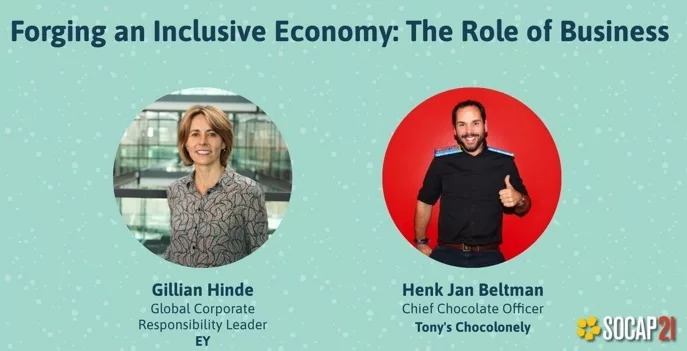While capitalism has created prosperity for some, it also has left many people behind. Business leaders and others in the impact community are pursuing a shift toward a more inclusive economy that balances profitability with equity and better serves low-income and marginalized communities.
During the SOCAP21 mainstage session “Forging an Inclusive Economy: The Role of Business,” Gillian Hinde, Global Corporate Responsibility Leader at EY, said the EY Ripples initiative aims to positively impact 1 billion people around the globe by 2030.
“Much has been said and written about why we need to bring about a more inclusive system,” she said. “By contrast, there is very little out there about how we can make that happen … and what businesses should be doing differently.”
That’s one reason why EY partnered with Acumen to create an inclusive business playbook designed to equip businesses of all sizes with a framework and inspiration that features stories of impact entrepreneurs plus actionable ideas and prompts for businesses. The playbook encourages business leaders to ask themselves how they can develop a systemic focus on serving the needs of low-income and marginalized communities.
It also includes case studies to inspire and aid businesses in their inclusive journey. One example of this is Tony’s Chocolonely, a chocolate bar company founded by a Dutch journalist that promotes dignity and fairness for cocoa growers through a commitment to uphold human rights and promote shared prosperity.
Henk Jan Beltman, Chief Chocolate Officer, Tony’s Chocolonely, said the business was founded with change as its goal. “We’re an impact company that makes chocolate,” he said, noting that most cocoa comes from western Africa. “Millions of farmers produce cocoa beans that are being sold to about 10 companies around the world, and those 10 companies produce billions and billions of bars.”
Beltman said it’s an unbalanced supply chain that starts with poverty on the cocoa farms, which rely on illegal child labor and modern-day slavery practices to harvest their product, and ends with most of the wealth going to the 10 chocolate companies.
Tony’s Chocolonely is working to make slave-free chocolate the norm in the next 10 years by raising awareness of the problem by setting a scalable example through its operations, he said.
“Every company should have a purpose, right? You should have a purpose to make the world a nicer place,” Beltman said. “And don’t call us a social enterprise. We’re an enterprise. And companies that don’t make the world a better place are just anti-social enterprises.”
Watch Forging an Inclusive Economy: The Role of Business
Presenters
Gillian Hinde, Global Corporate Responsibility Leader at EY
Henk Jan Beltman, Chief Chocolate Officer, Tony’s Chocolonely







